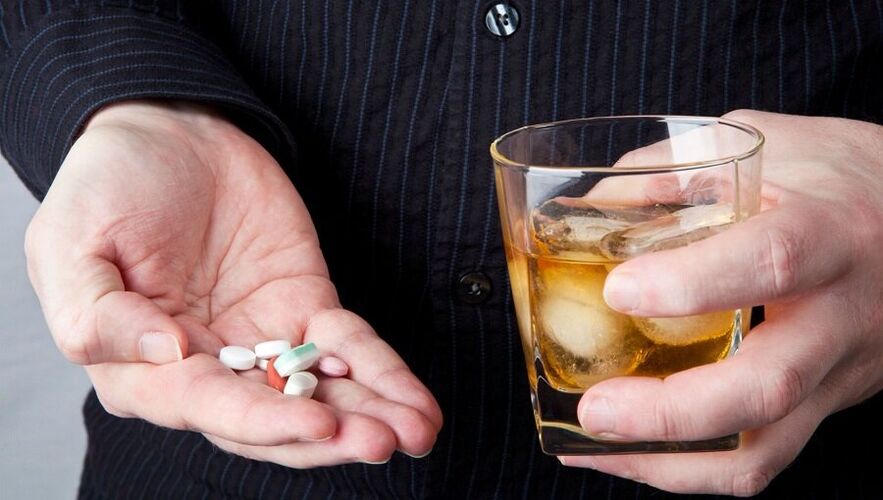Everyone knows that combining alcohol and antibiotics is forbidden, but few know when to drink alcohol after antibiotics. It is not clear how many days to wait after the last pill of the medicine. Many people wonder what will happen if you miss a glass or two during or immediately after the treatment period. With these questions we are trying to figure out what you need to do first to know the effects of alcohol and antibiotics on the body.

Alcohol treatment and contraindications
Antibiotics are not only very effective drugs, they are also dangerous. Their reception must be agreed with your doctor. The main indicator of the need to use them is the presence of a bacterial infection that the body cannot cope with on its own.
If a specialist has prescribed antibiotics, you should follow a few rules during such treatment:
- Strictly adhere to the timing and timing of taking the drug, which maintains a constant concentration of certain substances in the blood.
- The duration of medication is determined by your doctor. Generally, the course does not exceed 2 weeks and some medications are sufficient for 3 days.
- It is recommended to drink the antibiotic with clean water without gas.
- You must follow proper nutrition during treatment. You should exclude fatty foods and, of course, alcohol from your diet, even in small amounts.
The last rule must be taken into account in particular, especially not to drink. In addition, it is forbidden to drink alcohol immediately and for a certain period after a treatment. But why not drink alcohol after antibiotic treatment? When ethanol and its constituents enter the body, they break down into small elements, transforming them into simple compounds. And some molecules in the alcoholic beverage coincide with the molecules in the drugs, which can cause a serious disorder in the body.
It has been repeatedly shown that the effectiveness of antibacterial drugs decreases significantly after taking alcohol. In addition, such a mixture causes a heavy load on the liver, which adversely affects not only the work of this organ but also the body as a whole. Alcohol consumption after antibiotics or during treatment can cause unpredictable reactions in systems and organs.
Possible consequences
As already mentioned, alcohol affects the whole body immediately after taking concomitant or antibacterial drugs, not limited to its individual area, so it is impossible to predict the consequences. However, the most common are:
- If you consume alcohol while there are antibiotics in your body, a sharp form of allergy may appear.
- There is a high risk of taking medication, aggravation of poisoning and a hangover. Thereafter, drinking the usual amount may lead to loss of control. At the same time, there is a danger that we will get a mental deviation as a result.
- Alcohol after taking antibiotics significantly reduces the healing effect of the latter, which can lead to repetition of the duration of treatment or increase the dose of drugs, which will also have a detrimental effect on the body. In addition, increasing the dose of the drugs will help reduce their effects in the future and thus the application of the infection to the drug. An infection associated with an attenuation of the antibiotic has time to intensify and become resistant to it. Thus, after a course of antibiotics, the infection will reappear over time, and stronger drugs will be needed to eliminate it.
- Possible consequences include traditional symptoms: headache, nausea, mental haze, liver damage, and dizziness.
All of the above consequences can be avoided if you know when to take alcohol after antibiotics.
What deadlines do you have to meet?
There is no exact statement about how long after taking antibiotics you can consume alcoholic beverages. For each antibacterial drug, the number of days after which alcohol can be drunk is determined individually and should be determined by your doctor. This period is usually at least 10 days. This is the minimum period during which a person’s kidneys and liver normalize and the intestinal microflora recovers. However, these are general recommendations, it all depends on the characteristics of the organization.
If the patient has chronic kidney or liver disease, the time after which alcohol consumption is possible will increase slightly. And to avoid mistakes, it is better to consult a specialist on this issue. The longer the treatment lasts, do not consume alcoholic beverages, the better it will be for the body. After all, alcohol and so do not carry anything beneficial for the body and even more so during the period of weakness.
Today, the main contraindications to the possibility of drinking alcohol during antibiotic treatment and the general conditions of alcohol consumption that need to be followed were examined.
Taking these recommendations and rules into account, it turns out that not only do you get rid of the disease quickly with the help of antibiotics, but you don’t damage the body. But it is important to note that it is forbidden to drink antibiotics without a doctor’s prescription.
























